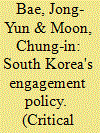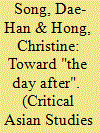|
|
|
Sort Order |
|
|
|
Items / Page
|
|
|
|
|
|
|
| Srl | Item |
| 1 |
ID:
127762


|
|
|
|
|
| Publication |
2014.
|
| Summary/Abstract |
During the progressive decade of the Kim Dae-jung and Roh Moo-hyun governments (1998-2007), South Korea actively pursued an engagement policy with North Korea that aimed to facilitate de facto unification by means of exchanges and cooperation, trust-building, and peaceful coexistence. But the engagement policy has been subject to harsh criticism for its silence over human rights conditions in North Korea. This article looks into the nature of conservative critiques of the engagement policy on the human rights front and elucidates how its proponents have responded. Attention is given to how the trade-off between peace and human rights, as well as that between basic human needs and human rights, constrained their open pursuit of a human rights campaign against North Korea. Also examined is their belief that democracy and human rights should not be imposed from the outside and that North Koreans should win them through struggle from within. For conservatives, hard-line pressures are of limited utility, and opening and reform, the introduction of market system, the expansion of civil society, and the advent of the middle class through the engagement policy are the best ways, albeit time consuming, to enhance human rights and democracy in the North. Finally, the authors critically assess recent debates on the North Korean Human Rights Act in the South Korea's National Assembly as a way of exploring the limits and promise of the engagement policy.
|
|
|
|
|
|
|
|
|
|
|
|
|
|
|
|
| 2 |
ID:
112464


|
|
|
|
|
| Publication |
2012.
|
| Summary/Abstract |
This paper examines the extent to which the European Union (EU) could be a normative power with the ability to define what passes for normal in a globalized world in its North Korean policy. In contrast with a rationalist view that limits the possibility of engagement and underestimates the implications of the EU's role in promoting North Korea's human rights conditions, constructivist-inspired approaches provide an alternative explanation by arguing that the pursuit of value-oriented policies is constitutive of actors' perceived normative identities. To this end, this paper investigates how humanitarian aid, institutionalized dialogues and multilateral approach are employed to endorse the EU's position as a normative power. In so doing, it also argues how and to what extent these normative operations are affected by its virtue, deontological and consequentialist ethics.
|
|
|
|
|
|
|
|
|
|
|
|
|
|
|
|
| 3 |
ID:
127763


|
|
|
|
|
| Publication |
2014.
|
| Summary/Abstract |
Since 1998, the National Endowment for Democracy (NED), a quasi-private, grant-making organization funded almost entirely by the U.S. Congress via the U.S. State Department, has been, directly or indirectly through its four core institutes, supporting right-wing, neoconservative South Korean human rights and defector groups. In addition to technical assistance, this support has included $6.7 to $11.9 million from 1999 to 2010, with an additional $3 million starting January 2009 directly disbursed to many of these groups by the State Department under then newly elected Barack Obama. This article contends that NED's "human rights" work is part of a much larger strategy of destabilizing the North Korean government in line with U.S. interventionist aims against its foes. By funding international conferences and defector critiques of North Korea (including strategic testimony provided before Congress in the push for passage of the North Korean Human Rights Act of 2004), NED has fostered a North Korean human rights knowledge economy that has substantially shaped public images and opinion about North Korea in South Korea, the United States, and around the world. At the same time, NED's radio broadcasting, propaganda leaflet drops, and other incursionary media have sought to sow discord in North Korea.
|
|
|
|
|
|
|
|
|
|
|
|
|
|
|
|
|
|
|
|
|